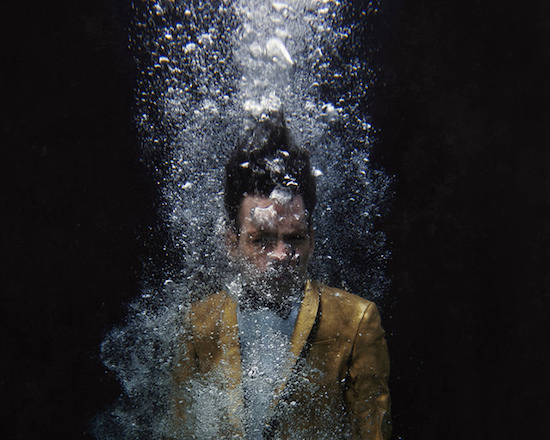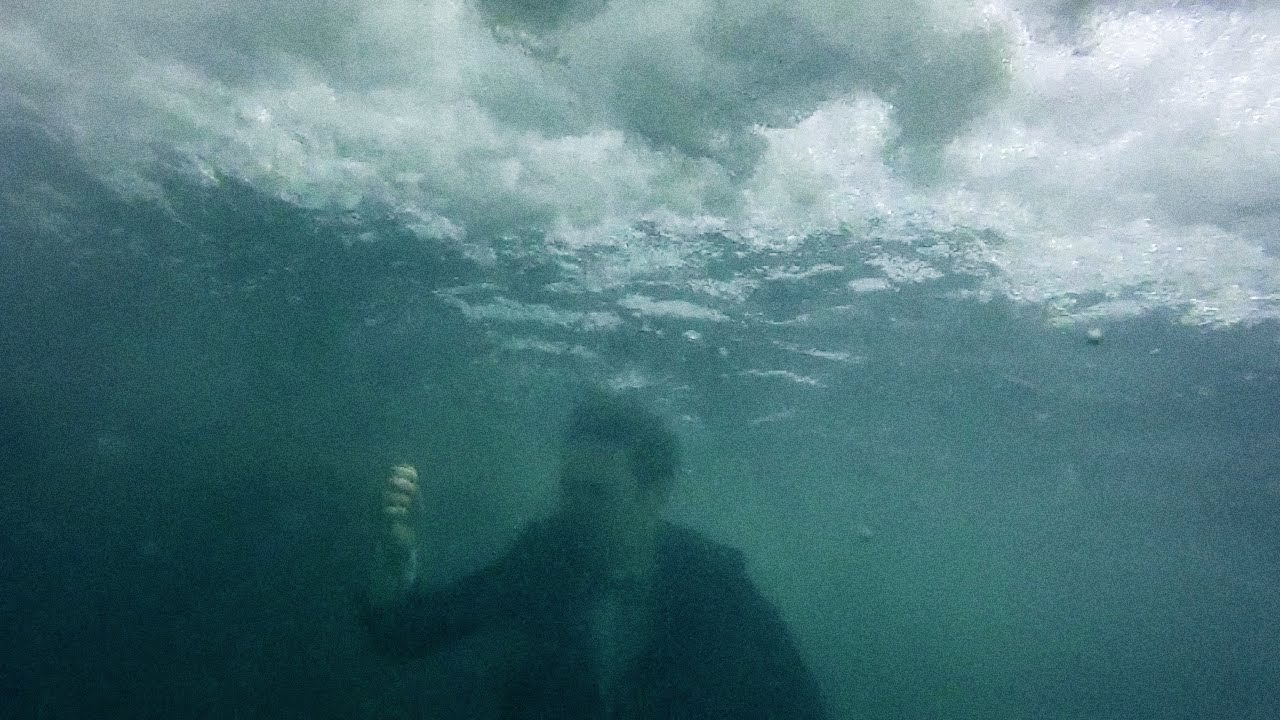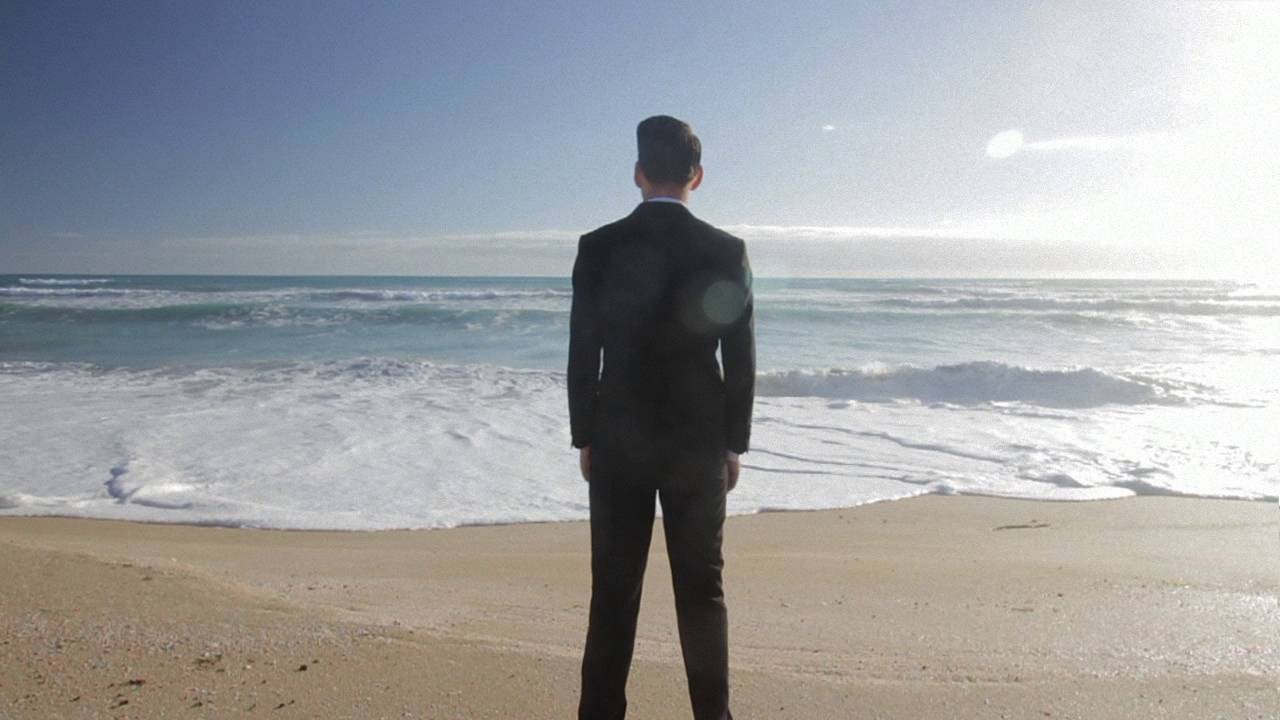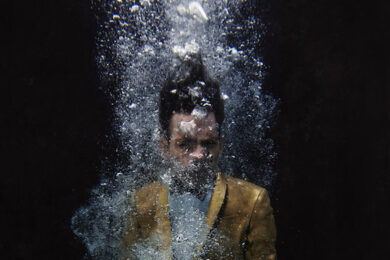Photograph courtesy of Alex Stoddard
Beside the LED glow of the NYPD’s Times Square kiosk, in a penned-in plot of concrete between the 24-hour Starbucks and the Hard Rock Cafe, 200 people wander about with glowing blue headphones over their skulls, fiddling with the knobs behind their right ears, trying to find an empty fold-out chair.
It’s 11.30pm on a Sunday and the majority of this crowd didn’t come to Midtown Manhattan to see Jherek Bischoff and his "Silent Orchestra". But stand still long enough in Times Square and you become a tourist attraction. So now intrigued tourists wander past the hip-high metal gates, taking selfies with the small crowd in shot, adding another image to their American Vacation on iCloud.
It’s a strange spectacle, all this among the shameless commercial chaos of Times Square. Tonight is essentially an orchestral silent disco: Bischoff and his pared-down chamber orchestra, using only electric instruments, play tracks from his new album, Cistern; the sound comes through headphones alone; the rest of Times Square, out of eyeshot, has no idea they’re there.
"You’re not allowed to make loud noises in Times Square after 11," says Bischoff into a microphone, his voice also solely in the headphones, interrupting the sirens and lorry horns of the city outside. "Which I find hilarious."
From there, Bischoff and the selected members of Contemporaneous – the New York-based orchestra that recorded the album with him – recreate one of this year’s most forcefully analogue albums through electronics. The once-warm clarinet of ‘Closer To Closure’ becomes synth-like, an affect from a late ’80s sci-fi show; the high, pendulous violins of ‘Headless’ that swirled around on record are thinner, now monophonic. It’s uncanny in the truest sense, an impression of an impression of what Bischoff first heard when he wrote the album.
But then, what Bischoff heard when he wrote the album is practically impossible to reproduce, least of all here. Three years ago, the Seattle-born artist visited an empty two-million-gallon cistern at a military base in Washington state. At first, he figured he’d play around with the acoustics, but he stayed for days. There was a 45-second reverb delay down there, enough for him to play a note on his bass and think for an unnatural amount of time about the next harmony, the right note to complement the echo. Before long, he’d brought a menagerie of instruments and a couple of collaborators down there to improvise with him.
And then, after a little while, he had Cistern, his third solo record. It follows string-quartet tributes to David Bowie and Prine he’s released this year, as well as a performance at the Bowie Prom at the Royal Albert Hall in July. It’s a unique piece of music, swelling and contracting around Bischoff’s glacial hooks. It’s modern classical, probably, though that hardly gets to the heart of the sound. The chamber orchestra builds and breaks; the violins do the job of the bass guitar; the bass does the job of the lead; piano is timpani. It’s a record that uses time as a collaborator, just as Bischoff used 2012’s Composed to collaborate with his friends. It is a unique record.
And it’s the opposite of Times Square.
During the last song in Bischoff’s Silent Orchestra set, at 11.57, 40 of the square’s huge advertising screens cut out and show Bischoff alone in the wilderness. It’s part of Times Square Arts’s programme Midnight Moment. The imposing TV screen that plays a 24-hour loop of Fox News’s Sean Hannity saying the words "fair and balanced" now shows the artist, dressed in a suit and bow tie, wandering through the wilderness. The screen above the Hard Rock Cafe – seconds ago advertising the new ScHoolboy Q record – now shows Bischoff painted gold, falling to the floor, unable to keep going through the greenery and hills.
And as Cistern‘s stunning title track squeezes through the headphones, Bischoff looks up in awe. His video is snaking up a skyscraper, repeated up into the dim-lit midnight.
A few days before this performance, we spoke with Bischoff about the making of the album and the way his upbringing has affected his music.
First of all, the Times Square video seems to be the opposite of the environment it’s getting shown in.
Jherek Bischoff: Yeah, basically. I wasn’t thinking of Times Square when I was making it; quite the opposite, obviously. But one thing that’s a through line through the film is that I was purposefully – other than myself and the clothing I was wearing – making sure there were no other human-made things, man-made things. So no trails, no roads, no technology, anything. Just strictly nature. To have that in the middle of Times Square is something pretty special, I think.
Much like the Times Square video, the level of seclusion within that space of the cistern is something you talked about in your Kickstarter video. Were you creeped out down there?
JB: Yeah, at times. Luckily, after the first day, I had one day where one of my friends, a violinist, came and improvised with me for part of the day. So I wasn’t down there completely by myself. Then the third day, a friend of mine, Morgan, who’s a multi-instrumentalist, came and improvised with me. But even still, the only light was through the manhole cover. We were in Seattle, so it’s not the most sunny place in the world. It wasn’t like a beam of bright light, it was more like a dull light. You could not even see close to the other side of the room. It’s a huge, huge space. So what I had done was set up one mono microphone close to me and then I put a stereo set of microphones way off in the distance. So when I was recording, if I wanted to have something be recorded and be really close up, I could cuddle up with that close microphone and play and you could hear all the distinct notes that I was playing. And if I wanted a really, really smeary effect, I’d walk away from that close microphone and just out into the room somewhere and it would just create this muddy textural sound. So sometimes I’d be wandering out there. It was like wandering out in space. You couldn’t see anything and you were hearing this otherworldly sound. It was pretty weird to be down there.
That’s a very physical recording experience, being able to walk away from something and knowing that’s going to affect the sound to that extent.
JB: Extremely. It was kind of like what the old-fashioned recording vibe was, where it’s like, "Okay, you don’t want to hear the acoustic bass as well as the singer? Well, put the bass player further from the microphone." So I was just kind of using that approach as a way to mix myself, or experiment further with the recording of the improvisation by just being able to be closer or further from the microphone.
You went down there in the first place with a guitar, right?
JB: A bunch of instruments. I brought down the guitar, a ukulele, a violin, a trombone, a clarinet, some percussion, bells. I actually brought my upright bass but it wouldn’t fit inside the manhole. At one point I actually climbed up outside of the manhole and put the bottom of my bass on top of the manhole so that would kind of cradle the bass. And then I improvised with my bass and had it recording downstairs. That was the only way I could get any bass stuff on there.
You use the word ‘improvisation’. I’m intrigued by what improvisation means when it’s just one person. What does that mean to you, when you’re alone in one space? How does it function? Is it just continuous playing?
JB: Well, it’s kind of like being a writer in the sense that you always hear other writers say, ‘Well, the best way to start writing is to just start writing.’ The same goes for improvisation. You want to start improvising, just start playing notes. And the more you do that, the more comfortable – or not comfortable – but I guess how you’re able to adapt to situations. You become more familiar with your instrument. As soon as you have a musical thought, you can go ahead and add to that musical thought and know your way around.
One interesting thing – I play bass and guitar and stuff like that. I know those instruments really well. But I don’t know how to play clarinet or trombone or any of these other instruments. I don’t actually know how to play ukulele even though I’ve played it a lot in the past. Because of the weird tuning it’s not exactly like a guitar. That’s one of the reasons I like that instrument – it makes for surprises. It’s not so predictable as the bass or the guitar is for me. I can start playing it and then I’ll go to a note that I think will be there, but because of the tuning, it’s a completely different note. That excites me. That’s why I had the ukulele around in the first place, years ago. It was to just break out of habits.
Two other things from what you said: one is, the amazing thing about the cistern is that, if you’re improvising in a dead room, you play your note and then you’re left with your thoughts and you have to be really quick on your feet and be able to move through many different musical thoughts seamlessly. Whereas with the cistern, you could play one note and then sit there and wait for 45 seconds while you’re thinking about the next note you’re going to play. So, improvising there is just, like, you play a note and then you had at least ten seconds to think, "What would be the perfect accompanying note to that?" And then you could add that note. And then there’s two notes and then you’ve got another 30 seconds of those two notes being together where you go, "What would be the perfect thing for that?" And you can just build this puzzle that was really, really amazing.
The other thing I was going to say is that I come from a rock background, but also I was super interested in jazz for a long time. I was training to be a jazz musician for quite a while. I never trained to be a classical composer or player, but I did train to play jazz. Of course, right away I got more interested in the far-out jazz than the traditional jazz, so I quickly was turned onto the John Zorn scene and all the wild stuff coming out of New York and Europe. So I was improvising a lot with friends, doing that primarily for a while. So improvising is a pretty natural thing for me.
Natural though it may be, being able to have 45 seconds – or any length of time – to think about what you’re going to play next, that seems like a complete rewiring of the way that you would have worked before.
JB: It is and it isn’t. Arranging is sort of the most exciting part of making music right now for me. I really enjoy the process of arranging because you’re given all the time that you need to decide on every single note: whether it should be there or shouldn’t be there, or if it should be a B or a B flat. All of these traces that you’re left with. You can just take your time. Usually when you’re playing with other people in not such a reverberant room, you have to be quick on your feet and think about stuff really quickly. But inside the cistern, it was almost like I was at home on my computer arranging and taking time thinking about the next step, the next note. Instead, the room was my collaborator. I could hear the note and sit there and think. I could be arranging as I was going in real time, which was fascinating.
Going down there, what instantly struck you about the space that you were going to go to arrangement and modern classical, or go to that set of instruments or a more orchestral arrangement?
JB: Well, right now, writing for chamber ensemble is the thing that excites me the most. So when I went down into the cistern, I didn’t know that I was going to make a record based on that time and those improvisations. But as soon as I started playing music down there, I realised that it was going to be something significant for me. Just releasing the improvisations or maybe going back down there after six months of refining some ideas, or going back down there and rerecording it – that wasn’t really appealing to me. Partly because you weren’t allowed to have more than a certain amount of people down there at the same time because of oxygen issues. And also, I mean, it was maddening myself to be recording down there. You shuffle your feet and you’ve got to wait for a while for that sound to dissipate. All that stuff. And having 12 people down there all shuffling, you would never get any kind of clean recording done down there. It would just be a wash of people sniffling and whatnot.
So I knew that I just wanted to use the stuff as an inspiration to make a larger scale work, if you want to call it that. And mostly, also, just to work with a size of ensemble that I was particularly excited about at that time.
Going back to the seclusion of the whole thing, you’ve talked about being raised on a sailboat. You’ve talked about how the record had a great deal to do with capturing these long stretches of time…
JB: Well, I wasn’t trying to capture that so much as it revealed itself to me as a serious thread in my life, I guess. Being raised on a boat felt like it was totally normal to me. I was just another kid hanging out, doing this and that. It’s only become very apparent to me in the last ten years or something how strange of an experience being raised on a boat really is. My girlfriend and I had a funny period of time where I was always wanting to hug her all the time. I looked at my brother and he’s the same way. It wasn’t that our family was necessarily more affectionate than others. It was that we were basically sitting on top of each other, or side by side squished in together all the time. Because the boat was that small. I mean, when we were eating a dinner, you were touched on both arms by the people sitting next to you. You had no room. So it became part of our nature to be close to people.
And then sailing, going across an ocean and going long distances super slowly, that didn’t seem weird at all to me, either. But now, when I travel places, like I went to Hawaii a while ago, it was such a different experience showing up there having not sailed there. You know, you show up there, it’s a beautiful place, but you don’t really realise how out in the middle of nowhere you are. As opposed to sailing there takes 17 days to get there and you really feel that distance of how far in the middle of nowhere you actually are.
I remember being on Hawaii when I sailed there. It felt unsettling to be walking around there because I was thinking, "This place could just sink at any second." In actuality, it totally can. But it really felt like, I am this teeny, tiny speck out in the middle of all that water, I feel so unprotected right now. It almost felt creepier than being on a boat, which is an even smaller speck out in the middle of nowhere. But I felt like I had some control over that situation.
I guess travelling that kind of long distance and travelling at such a slow pace, it wasn’t something that I was thinking about when I was inside of the cistern, but when I started hearing the music played back to me for the first time by an ensemble, it totally brought me back, immediately, to memories of sailing. And it really became apparent that this was some sort of a through line in my life that I was excited to explore more.
When you say you were brought up on a sailboat, how long for? What ages?
JB: From about five until I moved away from home at 18 or 19 or so. It was mostly in Seattle, then for three years, in my late teens, we sailed through Central and South America, through the Panama Canal and into the Caribbean and stuff like that.
So what were you doing for school?
JB: I did one year of school and I was doing correspondence school, which was actually another happy accident. Correspondence school is basically home school, but you teach yourself instead of your parents teaching you. I found that to be one of the most important things in my life is that I learned how to teach myself things. I feel like that’s something that schools should actually teach.
So yeah, I was doing correspondence school for a year, and then after that, it just became silly. I finally asked my parents, "We’re out here for another year or two. I could be out there snorkelling and surfing and playing music with locals and hiking and exploring and doing all that stuff, or I could be down here doing my geometry homework. What do you want me to really be doing right now?" And they were like, "Yeah, this is pretty stupid," and they said that as long as I got my high school equivalency test done when I returned home, that they were fine with me being a high school dropout.
Did you have musical instruments with you?
JB: Yeah, my dad’s a drummer and keyboardist and by brother’s a drummer. So we had a collapsible drum set, where each drum fit inside the other. So we had a drum set on board, I had a bass amp, I had a bass and a guitar, and this ridiculous instrument, the Chapman Stick. I don’t know if you’ve ever heard of one of those. It’s really fun and crazy. It’s like a guitar and a bass all on one neck, but you don’t strum it, you tap on all eight fingers. So you basically play it like a keyboard, but it’s a stringed instrument. So I had one of those. It’s what prog rockers use a lot. So I was messing around with that. And we had a little synthesiser onboard too. So yeah, we had a family band kind of vibe going. We’d pull up in different anchorages and show up and figure out who wanted to sing Bob Marley songs and whatnot.
So music was your way of getting into a different environment?
JB: Yeah, it was super helpful. And people always say that music is a universal language. It was very, very true. We could show up anywhere with any people speaking different languages and we could just be like, "You want to play that song? Yeah, okay." We would usually want to play Latin American songs, and they would usually want to play Santana or Jimi Hendrix and stuff like that. So we would trade off. So yeah, we were able to make a lot of friends that way and meet a lot of local musicians. It was a great experience.
Were you playing in the open water?
JB: Well, a funny story with that. One time – this was when we were circumnavigating Vancouver Island – we were in this anchorage all by ourselves. There was this huge cliff going straight out of the water. It was sunset time and we were outside having dinner or cooking dinner on the barbecue or something like that. And we kind of noticed that there was a crazy ricochet sound when we were talking, just because of these cliffs everywhere. So we were like, let’s get out the bass amp and turn it up all the way and just mess around. So I put my bass amp up on the deck and started banging around. It was creating this wild ricochet sound all through the anchorage. It was like a "hello, hello, hello" kind of thing. But it was a natural delay and reverb, out in the middle of nowhere in British Columbia.
That’s very similar to what you’ve been doing on Cistern…
JB: Yeah, it is. I hadn’t really thought about that.
What age were you then?
JB: I was probably like 15 years old or something like that.
So you definitely had an experience before where you had the time to think about your next musical move.
JB: Yeah, absolutely. That and another funny story was one time, my brother and I were down below. We could kind of set up his drum set on the inside of the boat, but not really. I would have to stand on the bass drum for us to fit. But we could kind of jam down below a little bit. We were just kind of messing around, and we started noticing this boat going past us, over and over and over again. So we stopped what we were playing and we went upstairs like, "What’s going on?" And the guy’s like, "Don’t stop playing, there’s this huge whale that keeps going past you guys and every time you start playing the whale comes around and every time you stop, it goes away. So keep playing so we can keep looking at it!" So yeah, we were somehow summoning some sort of whale call. It must have sounded real strange from below. Probably not like a whale call. He was probably just trying to check in on what the hell was going on.
Whales are very discerning.
JB: They only like the best music.
Cistern is out now on The Leaf Label





